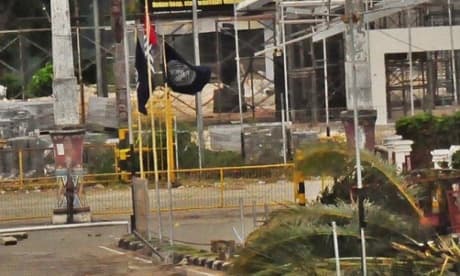West Papuan independence fighters 'injure two in border shooting'
West Papuan Revolution Army raised morning star flag before shoot-out ahead of legislative elections, say reports
Marni Cordell | The Guardian

Morning star and UN flags are hung near the border. Photograph: Jubi
West Papuan independence fighters did a "war dance", raised the banned morning star flag and shot at Indonesian security personnel near the border with Papua New Guinea on Saturday, according to a local journalist, in a provocative action ahead of Wednesday's legislative elections in Indonesia.
An Indonesian police officer and a military officer were injured in the shootout and three independence fighters were hit by police and military fire, said Victor Mambor, the editor of West Papuan online news outlet Jubi, who was tipped off about the incident early on Saturday.
Members of the West Papuan Revolution Army tore down the Indonesian flag and raised the morning star, as well as the flag of the United Nations, near the Skouw-Wutung border post at 5am on Saturday, Mambor told Guardian Australia.
The group "did a war dance" around the flagpole and set a carwash on fire, he said. Police and military monitored the situation from a watchtower but were shot at and the rebels then engaged in a gunfight with soldiers and police on Indonesian territory close to the border before withdrawing to PNG, Mambor said.
A government adviser told Guardian Australia the incident would have little impact on the legislative elections.
Franzalbert Joku, an adviser on the Papua desk in the Indonesian ministry of political and security affairs, said: "The incident has no impact at all."
He blamed the shootout on a "security lapse" and said he was surprised it had happened in a busy area where government officials were stationed on both sides of the border. He confirmed that the chief of Jayapura police, Alfred Papare, and a military intelligence officer were injured in the incident.
Joku told Guardian Australia he thought the pre-poll stunt was "intended as a way to disrupt – or to say, you're busy preparing to go to the polls, but we're still doing this".
"I think that is the only value I see that would have been gained by the perpetrators," he said.
Joku, who is also a Papuan candidate in the elections, said West Papuans needed to work with the Indonesian government, not against it, to improve conditions in the province.
"Persevering with a culture of political agitation under whatever guise is counter-productive," he said.
Exiled West Papuan leader Benny Wenda, who is leading a campaign for West Papuans to boycott the Indonesian elections, told Guardian Australia that, while he was touched to see the morning star flag raised in this "very symbolic place", he was concerned the border incident would lead to reprisal attacks against the thousands of West Papuan refugees living in PNG.
"I know this border post very well, and as Papuans, over the last 50 years our observation is that any pro-independence activities taking place close to the border will make the Indonesian government extremely angry and they are very likely to force the PNG government and police [to] look for West Papuan refugees and burn down their houses in revenge or kill them," he said.
